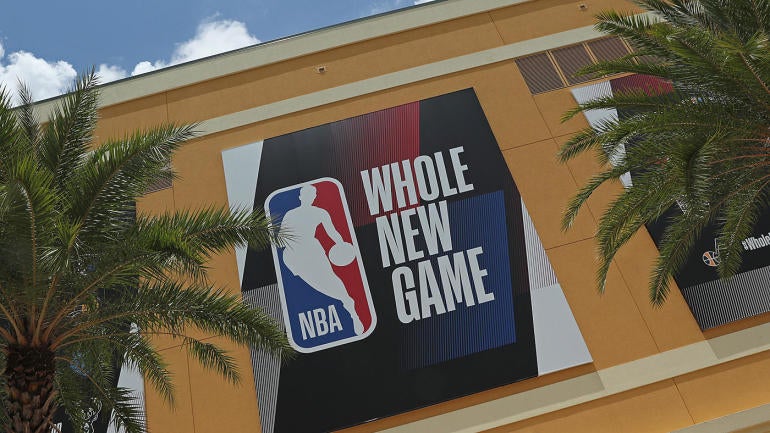
The NBA crowned a champion on Sunday, the culmination of 90-plus days at Disney World, where 22 teams arrived in July to restart the 2019-20 season in the middle of a pandemic. It was marketed as "A Whole New Game," but the broadcast presentation attempted to mimic, if not replicate, the feel of a regular one.
A few days in, it seemed like all of us covering the league were marveling at how little we thought about the fact that the only fans in the arena were virtual, sitting in fake seats, displayed on enormous screens surrounding the court.
It was a bit disorienting at first to plonk myself on the couch and watch live basketball at 1 p.m. ET on a weekday. For a basketball writer, though, there is nothing more normal than orienting your life around the NBA schedule. Most of my stories, especially once the playoffs started, could have been written any other year.
The quality of play was superb, and the constant barrage of games and storylines made it easy to dive deep into the bubble from afar. In the seeding games, the Phoenix Suns were perfect, T.J. Warren went on a scoring binge and Damian Lillard went on a rampage. In the first round, Luka Doncic had his first Playoff Moment, we all yelled, "DORT," and Jamal Murray ascended to a higher plane, where he and Donovan Mitchell dueled spectacularly.
In the second round, OG Anunoby hit a miracle shot and the Denver Nuggets burst the Los Angeles Clippers' bubble in stunning and historic fashion. In the conference finals, Anthony Davis hit the shot of his life and Bam Adebayo ran straight through Daniel Theis to get to the game's biggest stage.
Only the diehards will remember the pesky Brooklyn Nets and the weird, young San Antonio Spurs. Jimmy Butler's performance in Game 3 of the NBA Finals, however, was immediately legendary, and it became more meaningful when he reached the same level in Game 5. LeBron James had another playoff run for the ages, and when the Los Angeles Lakers hoisted the trophy, the league was also victorious -- it had pulled this thing off.
The health and safety protocols worked. More than a thousand people sequestered themselves and made sacrifices so that we could see a guy who played Division III ball at Williams College hit seven 3s in a Finals game. And the NBA and NBPA funded a saliva-based coronavirus test that gained FDA approval.
But I am not sure what to do with the dissonance that comes with seeing a professional basketball league earn praise for protecting its employees from a deadly disease while watching the virus continue to run rampant outside of the bubble. Or, as The Atlantic's James Hamblin put it: "It's a testament to human ingenuity and resilience how quickly we can reinvent things and get people back to work, safely and effectively, when a group of billionaires has a direct financial stake in making it happen."
COVID-19 has killed more than 215,000 people in the United States. Before I sat down to finish writing this column, I read a New York magazine story by David-Wallace Wells titled, "The Third Wave of the Pandemic Is Here." It estimated 25,000 more deaths before Election Day and 100,000 before the next presidential inauguration. It referenced a Washington Post column in which immunologist Rick Bright writes that he resigned his position at the National Institutes of Health "because the administration has in effect barred me from working to fight the pandemic." Bright warned that "the country is flying blind into what could be the darkest winter in modern history."
In this horrifying context, it doesn't feel right to frame the Lakers' championship as a triumph over adversity, even though the players surely experienced it that way. It doesn't feel right, either, to cast the NBA as a model for success or a beacon of hope, even though it followed the science competently and accomplished an ambitious and difficult goal.
Since I wasn't in the bubble, I hesitated to even write about this subject. "You only really get it if you're here," Chris Paul said, via The Washington Post's Ben Golliver, who just left Florida himself. In Golliver's farewell essay, he said he appreciated the NBA's attention to detail, but he won't miss bubble life. For everyone inside, the physical isolation took a mental toll. Nobody wants to do this again.
Golliver also called the daily testing "the ultimate privilege." That is precisely what this was: a small population cocooned from the dangerous world around them.
I cannot directly relate to the experience of living on "campus" for months wearing a proximity alarm and a credential and covering every playoff game from a courtside seat. I am insanely privileged, however, in that I able to do my job during this pandemic from the comfort of my apartment.
This also makes me a clear beneficiary of the NBA's decision to resume the season. And even if I were not a sportswriter, I would be grateful to have spent these last few months thinking about, talking about and getting excited about basketball again.
Other sports are either establishing their own bubbles or putting people at massive risk. Hours before the Lakers won the title, Rafael Nadal won the French Open. He said that he was "super happy" about the victory, but not as much as he would be under normal circumstances. "The feeling is more sad than usual," Nadal said days earlier, following his first-round match. "Maybe that's what it needs to feel like. It needs to be sad. Many people in the world are suffering."
Maybe the thing to do with the dissonance is sit with it.


















